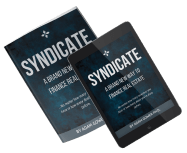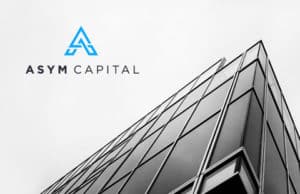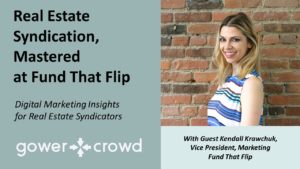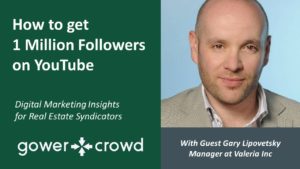FREE TRAINING
What is Real Estate Crowdfunding?
Learn how to build wealth and earn passive income in real estate while someone else does all the work.
Podcast Episode 338 Hunter Thompson, Managing Principal | ASYM Capital
Why You Should Host a Podcast
 Today's Guest - Hunter Thompson, Managing Principal | ASYM Capital | Author | Raising Capital for Real Estate
Today's Guest - Hunter Thompson, Managing Principal | ASYM Capital | Author | Raising Capital for Real Estate
On today's episode, I welcome Hunter Thompson. He's the Managing Principal at ASYM Capital, a prolific author, and one of the most knowledgeable experts you'll find in the areas of podcasting, real estate investment, and portfolio diversification.
At ASYM, his number one priority has been to help clients invest much smarter, seeking out passive cash flow opportunities with an eye toward healthy ROI and avoiding stock market nonsense. In this capacity, he's become intimately familiar with acquisitions, bridge financing opportunities, retail opportunities, and more.
Today, Hunter and I chat about podcasting as an alternative to in-person networking, how creating content directly leads to raising more capital, why spending time on things that don't make money actually makes you money in the long-run, and much more. It's a fascinating chat that you'll want to check out if you're at all curious about real estate investing, podcasting, or digital marketing in general.
What You're Going to Learn
* Hosting a Podcast as an Alternative to Real Estate Networking Events
* Overcoming the Emotional Hurdles of Starting a Podcast
* Podcasting in Real Estate Can be a Great Tool for Expanding Your Business
* How to Raise More Capital by Creating Content Online
* Best Practices for Distributing and Repurposing Your Podcast Content
* Making Money by Spending Time and Energy on Things That Lost Money
* How a Free Podcast has Helped Raise Millions for Real Estate Investments
* An Intentional Strategy for Becoming a Guest on Someone Else’s Podcast
* And much more!
Related: The Hunter Thompson Guru Review
Listen To or Watch the Full Podcast Here
Show Highlights
Hosting a Podcast as an Alternative to Real Estate Networking Events
Adam: Why did you start podcasting? Tell me all about that.
Hunter: To be honest with you, I'm probably asking myself ... When you ask me that, the first thing that comes to mind is why did I not start sooner? It's just the best medium, and it's clearly- for my personality, it was such a good fit. As soon as I did my first episode, that was the first thing I thought is why didn't I start earlier?
So, to be honest with you, when I got into the real estate sector, the main thing was networking events. People would throw them weekly, monthly, depending on what it is. I used to go to three to five every single week, living in Los Angeles, driving around, going through traffic, and paying $10 to $25 every single event.
The challenge is not really even the time or the dedication it took to do that, but the fact that the attendees were not of the caliber that I felt I was constantly learning from. That's no disrespect, it's just that everyone that does a lot of networking events knows you hit a ceiling at a certain point.
I felt like there was an opportunity to bring a higher level of sophistication in a much more efficient manner and a more scalable strategy, as well. So, I started in 2016, and it's really as simple as I ... During those years of building up my network - I have a long background of investing, as well - I'd created an incredibly compelling and interesting group of friends.
I basically contacted my friends that I had been doing business with and said, "Let me record these conversations," and the first conversation we ever recorded was one of our best episodes. That's when I was like, man, why didn't I do this earlier? This stuff was sitting here for years. So, that's when I got started. That's why, as well.
Overcoming the Emotional Hurdles of Starting a Podcast
Adam: Let's go back to the beginning. What were the biggest challenges that you found just getting the engine going to start your podcast?
Hunter: Well, most people's first podcast episode's going to be their worst, so I think a lot of people fear that. They're worried that this is going to be online, which means it's in ink, which means it's forever, and it can be easily shared. When I announce I'm going to have a podcast - this is something that maybe a lot of people are thinking right now that haven't done this ... They're thinking, okay, on a risk-adjusted basis, it's favorable; as in it doesn't cost more than $200 to get started.
But that doesn't factor the emotional component in, which is a big reason a lot of people struggle in business. If you're not prepared for the embarrassment of fumbling in your words; if you're not prepared for the embarrassment of forgetting to record a really important conversation with someone you have a lot of respect for, those are the types of things that can really limit people's success. That was a concern of mine, just like everyone else.
Again, the first episode will likely be your worst, so give yourself permission to make those mistakes. There's many, many things that I can add along the way, but that was a big hurdle was just that emotional component of saying, to the world, "I think that what I have to say is worthwhile." That is a big hurdle for a lot of people, myself included.
Podcasting in Real Estate Can be a Great Tool for Expanding Your Business
Adam: Going to a conference, which is what most people do think about ... My clients tell me, "We just flew to this ..." Why are you doing that even now? What is the connection between going to a conference and having a podcast? What are the similarities, what is the overlap, and what are the benefits - pros and cons - of having a podcast over that?
Hunter: Sure. I think there's an important distinction to be made between typical weekly/monthly networking events, and conferences, and podcasts. I think they all play a role, but my real challenge was that I was struggling to go above a certain hurdle at just typical networking events. Again, with a purchase price of, let's say, $25, it attracts a lot of people that are not interested in participating in a real estate business in the way that I was interested in participating.
I know that you are a huge proponent of the syndicated model. Almost all of my entire portfolio is invested in passive syndications. When you invest in syndications, or if you create syndications, you stand to gain high returns as a passive investor. If you create them, you stand to gain millions and millions of dollars. When you're able to generate millions and millions of dollars, you don't find yourself with the time to go to a lot of in-person events. For myself, someone that's positioned their portfolio like that, I'm not meeting a lot of people that I'm going to be working with, or investing with, or raising capital from.
Now, the conferences, let's say most people maybe attend somewhere between two and four a year. These are typically in the $500 to $1,500, to maybe even $3,000 range. That can attract a lot of caliber of talent. The challenge there is the expense, itself. You're playing this game where, if you're going to fly to Orlando for four days, spend three nights in a nice hotel, and pay for the ticket price, you're talking about $3,000 to $5,000 on a business expense, and you're hoping that you're going to get the best out of it.
There's an amazing way to supplement that, especially as it relates to education. But the component that I think most people give up is that podcasts can be excellent for networking, as well. I'll give you a perfect example - this conversation. Adam and I have known about each other for several years; we haven't gotten to connect, but now I'm positive, if we continue this conversation, we'll eventually find a deal that we can work on together; or even better, we'll find a way to solve a problem for someone else because we'll know about each other and know what our interests are. That's a great way to do it. Another way to do it is to reach out to guests that speak your language, that you feel, from a gut-intuitive perspective, that you should reach out to them and start that conversation.
That's just some of the examples. I think the networking event, the conference, and the podcast medium all are incredible. Just one more pitch about the podcast medium - from an influencer's perspective, it's the most intimate source of communication. You're literally plugged into someone's ears. You can listen at a speed that's advantageous for you. You can listen while you're going and coming to work. I know you have a PhD. I'm confident that someone can get an MBA in real estate or, at least, the equivalent, driving to their job. That is an unbelievable thing, and I'm such a ... I'm very, very grateful to be part of it and to be able to participate in people's learning, as I know you are, as well.
Best Practices for Distributing and Repurposing Your Podcast Content
Adam: How do you use the content? I can share with you what I do, but I'm interested [crosstalk] just recorded a podcast; your podcast. How do you actually now use that digital recording that we put together, that audio recording?
Hunter: The first thing that's going to happen is it's going to be downloaded to Libsyn, which is our syndicated real estate hosting platform, and that will send it across multiple different platforms. So, that's going to go to SoundCloud; it's going to go to Stitcher; it's going to go to iTunes, and a variety of other ones, such as Google Play, et cetera. The main one, at least for our purposes, is iTunes, because most of our listeners are going to be listening on an iPhone, and they're going to be using the podcast app. Now, we also have had success taking a 15-minute clip of that podcast, and posting a video to Instagram, or Facebook to generate some attention for that particular episode. That's really the extent of how we use that.
Another way we can reuse things, typically - if it's a really amazing episode - we can convert that to text via a company called Rev.com; R-E-V dot com, I believe, for about a dollar a minute of audio, and we can create an e-book from that. If we did a really specific conversation, let's say, just about podcasting, and a lot of our listeners were interested in that topic, we could convert this very conversation for probably about, and, there, you've written your first e-book, and you didn't have to become a good writer.
How a Free Podcast has Helped Raise Millions for Real Estate Investments
Adam: How many investors have invested your deals with whom you have established a relationship via your podcast?
Hunter: Almost all of them.
Adam: Right!
Hunter: You know? Almost all of them [crosstalk]
Adam: They've not bought your podcasts. They've not paid for it-
Hunter: That's right.
Adam: -but you've raised millions of dollars because of it.
Hunter: Exactly. Tens of millions of dollars. Exactly because of that [crosstalk] and more importantly, it's not just that it's attracted them, and they say, "I saw you on a podcast." We can talk, also, about how to get on other people's podcasts in a moment, but the key is that it's the level of buy in. I think a lot of people are contemplating building their own brand, and they want to just be like everyone else.
Part of this is - from a tribal perspective; from an evolutionary perspective - I think we're wired to want to be liked by everyone. There's a good reason for that. But the reality is that is not at all how this works, economically. I don't want to have a little bit of buy-in from everyone. I want to have a 100-percent buy-in from just a few hundred people. Those few hundred people, especially accredited investors, can drastically change the financial outlook of your entire life.
An Intentional Strategy for Becoming a Guest on Someone Else’s Podcast
Adam: You talked about- you said we'll get to it in a minute, so I'm going to pick you up on that - how to get on other people's podcasts, why does that matter?
Hunter: Yeah. The real question is how can I leverage what someone else has built to attract people into my infrastructure? I mentioned all this work we're doing for free. Well, it's not really helpful unless people are in the infrastructure.
Prior to doing this, though, it's really important that you have a lead-capture magnet. Before going on any podcast ... Going on a podcast without a magnet, at the end of the day, a call to action, is not going to generate results. So, it's important to have what most people refer to as an e-book, for example; some kind of free report that you can get in exchange for an email address.
That's an entire different conversation, but, typically, somewhere between 6,000-10,000 words, something that you believe can speak to your investor base that will last a long time. Now, once you have that, you've already done all the hard work. Now, the question is can I get in front of new people, talk about the content that you're an expert in because you just wrote this book ...
I talk about it in my book, how to do it really ... I'll give an example. I will have a V.A create a Google form and it'll have something like this - the name of the podcast, the name of the host, the email of the host, a rating on a scale of 1 to 10, in terms of how like my book or how relative my information will be to them, and then the number of Twitter followers, maybe, the number of comments in iTunes.
And I'll search by one of those metrics - number of Twitter followers, number of comments in iTunes ... Which, by the way, make sure to rate this show that you're listening to right now. Adam is giving away so much great content! Rate the show because it gives you the ability to attract great guests. This is the whole process that virtually everyone in the space is doing something like this. Then I have my V.A. start reaching out to them with a one-page highlight reel of my speaking credentials. What have I done? I've raised several tens of millions of dollars. I've written a book about the topic. I'm the host of this podcast, and other things. That's compelling.
Now, if you're just getting started, I actually suggest you do something that's counterintuitive. Sort again by number of reviews, but sort by least, and start at the bottom. By the time you get to guys like Adam, you've been on three or four podcasts, you've been on a lot-
Adam: I'd be the first one on your list.
Hunter: Exactly.
Adam: That's why I'm the last on yours.
Hunter: No, no ...
Adam: After four years. Here he is ... Where's Gower? There he is! Is there anyone else? Nope? Get him on the phone.
Hunter: Nothing could be further from the truth. But you get what I'm saying; once you get that momentum, Adam mentioned that he doesn't want to go back and listen to his first interview. Well, same will be true for you. So, don't jump all the others and reach out to Adam because you don't want to blow it in a big way on a big stage. Get some momentum so that when you send it out to the bigger shows, you can show them that you're competent in being able to speak. That, right there, is a $2,000 idea. That is the playbook for making money in this space right now.















